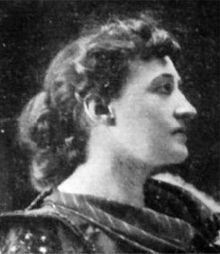- Sarah Grand
-
Sarah Grand (10 June 1854 – 12 May 1943) was a British feminist writer active from 1873 to 1922. Her work revolved around the New Woman ideal.
Contents
Personal life
Madame Sarah Grand was born Frances Elizabeth Bellenden Clarke in Rosebank House, Donaghadee, County Down, Ireland of English parents. Her father was Edward John Bellenden Clarke (1813–1862) and her mother was Margaret Bell Sherwood (1813–1874). When her father died, her mother took her and her siblings back to Bridlington, England to be near her family who lived at Rysome Garth near Holmpton in East Yorkshire.[1]
In 1868 Frances was sent to the Royal Naval School, Twickenham, but after a year she was asked to leave and went on to a finishing school in Kensington, London. In August 1870, at the age of sixteen, she married widowed Army surgeon David Chambers McFall, who was 21 years her senior and had two sons from his previous marriage: Chambers Haldane Cooke McFall and Albert William Crawford McFall. Frances and Chambers McFall's only child, David Archibald Edward McFall, was born in Sandgate, Kent, on 7 October 1871. (Her son became an actor and took the name Archie Carlow Grand.) From 1873 to 1878 the family travelled in the Far East. In 1879 they moved to Norwich, and in 1881 to Warrington, Lancashire where her husband retired. [2]
Upon returning to England, she was unhappy with her husband's steadily degrading sense of ethical moral character, and she turned to writing to cope. Her first novel Ideala, published in 1888 gave her enough money to leave her husband. [3]She transformed herself into Madame Sarah Grand, a"New Woman", an archetype she and her female contemporary colleagues progressed. Grand established the phrase "New Woman", in a debate with Ouida in 1894. [4]She lived briefly in London then latter for 20 years in Tunbridge Wells Kent, during which time she took an active part in the local women's suffrage societies, as well as travelling extensively, particularly to the United States on a lecture tour, in the wake of notorious sensational fame caused from her novel The Heavenly Twins. Although it gained her mixed angry criticism, her work was well received with notable authors as George Bernard Shaw, and Mark Twain. [5] 1920 she moved to Bath and was for several years Lady Mayoress alongside Mayor Cedric Chivers. She died at her home at The Grange in Calne, Wiltshire, on 12 May 1943.
Writing
Her work dealt with the New Woman in fiction and in fact, she wrote treatises on the subject of the failure of marriage, and her novels may be considered strongly anti-marriage polemics.
The New Woman novel was a development of the late 19th century. New Woman novelists and characters encouraged and supported many different types of political action in Britain. For some women, the New Woman movement provided support for women who wanted to work and learn for themselves, and who started to question the idea of marriage and the inequality of women. For other women, especially Sarah Grand, the New Woman movement allowed women to speak out not only about the inequality of women, but about middle-class women's responsibilities to the nation.[6] In The Heavenly Twins Grand demonstrates the dangers of the moral double standard which overlooked men's promiscuity while punishing women for the same acts. More importantly, however, Grand argues in The Heavenly Twins that in order for the British nation to grow stronger, middle-class women have the responsibility of choosing mates with whom they might produce strong, well-educated children.
Criticism
The Berg Collection of the New York Public Library keeps Mark Twain's copy of The Heavenly Twins. Twain filled the margins of the book with increasingly critical comments, writing after one chapter, "A cat could do better literature than this."[7]
Works
- Ideala, 1888
- The Heavenly Twins, 1893
- Our Manifold Nature, 1894
- The Beth Book, 1897
- Babs the Impossible,1901
- Adnam's Orchard, 1912
- The Winged Victory, 1916
- Variety, 1922
External links
- Sarah Grand at The Literary Encyclopedia
- Works by Sarah Grand at Project Gutenberg
- Works by or about Sarah Grand in libraries (WorldCat catalog)
References
- ^ http://www.ulsterhistory.co.uk/grand.htm
- ^ http://www.ulsterhistory.co.uk/grand.htm
- ^ http://www.donaghadeehistoricalsociety.org.uk/#/sarah-grand/4548334560
- ^ http://www.oxfordbibliographiesonline.com/view/document/obo-9780199799558/obo-9780199799558-0045.xml;jsessionid=923B637A9C126376367C44AE024200B1
- ^ http://www.oxfordbibliographiesonline.com/view/document/obo-9780199799558/obo-9780199799558-0045.xml;jsessionid=923B637A9C126376367C44AE024200B1
- ^ Jusova, Iveta. The New Woman and the Empire: Gender, Racial, and Colonial Issues in Sarah Grand, George Egerton, Elizabeth Robins, and Amy Levy. The Ohio State University Press, 2005.
- ^ Frazier, Ian. (2009-01-07) Marginalia by Nabokov, Plath, Twain, and Coleridge. The New Yorker. Retrieved on 10 August 2011.
Categories:- 1854 births
- 1943 deaths
- English novelists
- English women writers
- Feminist writers
- People from Calne
- People from Donaghadee
- People from Sandgate, Kent
- Victorian novelists
- Women novelists
- Victorian women writers
Wikimedia Foundation. 2010.

